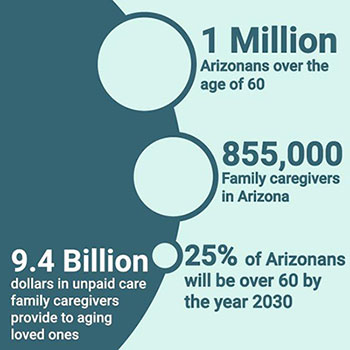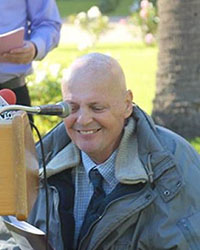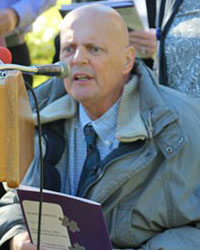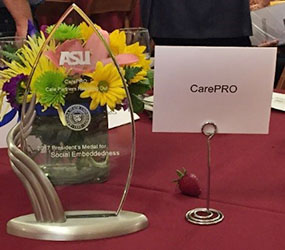Older Americans Month: Aging Arizona

Arizona is a retirement haven, and home to more than a million citizens over the age of 60. In 2012, 19 percent of Arizonans were over the age of 60. The DES Division of Aging and Adult Services (DAAS) Arizona State Plan on Aging 2015-2018 reports by the year 2030, that will grow to about 25%. Thanks to our good weather, affordable housing and comprehensive health services, Arizona has one of the oldest populations in the country. In LaPaz County, 41.9 percent of residents are over 60.
Seniors today are generally healthier, more active and independent than ever before. DAAS works with eight Arizona Agencies on Aging (AAA), the Governor’s Advisory Council on Aging and the Governor’s Office on Aging to help seniors maintain their quality of life and remain in their homes in their communities. These goals are outlined in the State Plan, along with other goals, objectives and strategies to help seniors live safely with dignity, choice and independence.
Central to that is the role of the caregiver. There are approximately 855,000 family caregivers in Arizona, providing $9.4 billion dollars worth of unpaid care to loved ones.
“I work full-time and try to take care of both my disabled husband and my 88 year-old father,” said one caregiver, who was part of one of 16 focus groups which provided feedback for the State Plan. “It is incredibly difficult to manage both financially and emotionally. I don't have time to go to support groups or volunteer, although I would like to.”
The DAAS Family Caregiver Support Program (FCSP) seeks to provide these individuals with the resources they need. The FCSP program provides the following:
- Information about available services.
- Assistance in gaining access to supportive services.
- Individual counseling, support groups and training related to the role of a caregiver.
- Respite care providing caregivers with temporary relief from their duties.
- Supplemental services to compliment care provided by caregivers.
The Care Partners Reaching Out (CarePro) program is another resource available to caregivers. A collaborative effort of DES, Arizona State University (ASU) and the Nevada Aging and Disability Services Division, CarePro provides workshops that educate caregivers about dementia and its impact on families, and offers respite care to attendees, so they can participate in the workshops and not worry about leaving their loved ones alone.
Caregivers receive training in stress management techniques to help them cope with the effects of the disease on their loved one. They are trained in how to communicate with someone suffering from memory loss. A personalized telephone “coach” is available to assist caregivers in implementing the skills learned at the workshops. Individuals interested in participating in the program must pre-register and complete an initial screening process.
Many seniors who were coming for the winter now live here full-time, and don’t have family nearby to take care of their needs.
“Both of my kids are on the East Coast and busy with their lives, so I want to know what’s available for me in my situation when I can no longer stay by myself,” said another focus group member.
The most common complaints that come into the DAAS Adult Protective Services (APS) program involve self-neglect. Many elderly adults are simply not able to care for their medical needs, their home environment, their finances or even their basic hygiene. If someone suspects self-neglect, he or she should call APS.
The AAAs are a valuable resource of support for older Arizonans. They offer either directly or through their provider networks:
- Home delivered meals
- Home and community-based services, such as adult day care and personal care
- Family caregiver support
- Assistance with accessing legal information and services
- Ombudsman services for residents of long term care facilities
- Mature worker services
- Exercise and healthy living programs
- Health insurance assistance
- Case management
Caring for a loved one with Alzheimer’s or another form of dementia is “one of the hardest forms of caregiving you can do.” So said the late David Besst, the State Caregiver Coordinator, who cared for his mother until she passed from Alzheimer’s.
Next week, a closer look at the challenges of this memory-stealing disease, and why advocates for Alzheimer’s research believe the cure will be found in Arizona.
The Arizona State Caregiver Coordinator is a position in the DES Division of Aging and Adult Services. (DAAS) Until he passed away from cancer in January of this year, David Besst served in that position.

During his 11 years at DES, Besst worked with family caregivers, providing support, training and resources. He created the Caregiver Resource Line and the Respite Voucher Program. The Respite Voucher program enables caregivers that are not eligible for services to receive $300.00 a quarter for Consumer-Directed Respite Services.

Besst also went above and beyond his duties at DES, working on behalf of caregivers outside of the agency. He founded the Arizona Caregivers Coalition, a community-based organization that provides support and serves as an advocate for Arizona family caregivers. As the caretaker for his mother who suffered from Alzheimer’s, Besst knows well the toll illness can take on those providing care. He also founded Care Partners Reaching Out (CarePro), a group-based program that teaches caregivers self-care skills and strategies to maintain their overall well-being as they care for loved ones affected by Alzheimer’s and dementia. Since its inception in 2009 there have been over 1,500 CarePro graduates. The Alzheimer’s Association Chapters across Arizona and Nevada adopted CarePro as part of its permanent program.

Best was recognized posthumously for his efforts this spring. On April 19, 2017, Arizona State University President Michael Crow awarded the President’s Medal for Social Embeddedness to Besst and his colleagues who worked on the CarePro program.
“They are innovators,” said Crow. “They recognized a need and brought to a life a solution which was previously non-existent.”

